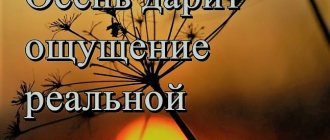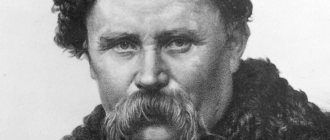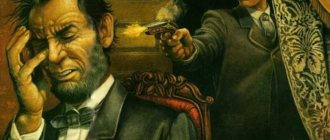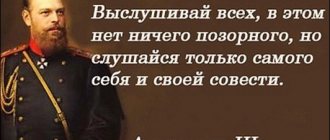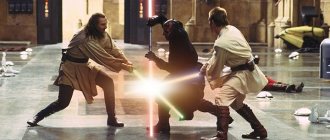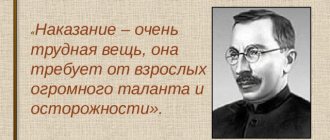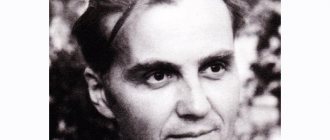Famous quotes by Konstantin Dmitrievich Ushinsky (50 quotes)
Konstantin Ushinsky is the person who had a beneficial influence on the education system. In those days, schools practiced corporal punishment, cramming and teacher arbitrariness. Naturally, this caused negative emotions in the children and Ushinsky realized that the time had come for change, and most importantly, he understood how to act. This collection contains famous quotes from Konstantin Dmitrievich Ushinsky.
A teacher must have an unusually large amount of moral energy so as not to fall asleep under the soothing murmur of a monotonous teacher's life.
Education is the greatest question of the human spirit.
Only education that will base its rules on a significant opinion, and live and develop with it, has real educational power.
Education, a modest matter in appearance, is at the same time one of the greatest affairs of history, on which kingdoms are based and entire generations live.
By treating a patient, the doctor only helps nature; in the same way, the mentor should only help the student struggle with the difficulties of comprehending this or that subject; not to teach, but only to help learn.
The main road of human education is conviction.
In order to overcome a feeling of shame, sometimes no less heroism is required than in order to overcome a feeling of fear.
The most important part of education is character education.
Never promise a child what you cannot keep, and never deceive him.
In order for upbringing to create a second nature for a person, it is necessary that the ideas of this upbringing pass into the beliefs of the pupils, beliefs into habits.
Education, if it desires happiness for a person, should educate him not for happiness, but to prepare him for the work of life.
The matter of education is so important and so holy, just a holy matter. Here the seeds of prosperity or misfortune for millions of compatriots are sown, here the veil of the future of our homeland is revealed.
Attention is the only door to our soul.
A child's feeling, just like a child's thought, should be guided without force.
Being fair in thought does not mean being fair in practice.
Almost everyone admits that education requires patience, but very few have come to the conclusion that, in addition to patience, innate ability and skill, special knowledge is also necessary.
The main road of human education is conviction.
The art of education has the peculiarity that to almost everyone it seems familiar and understandable, and sometimes even easy - and the more understandable and easier it seems, the less a person is familiar with it, theoretically or practically.
If you successfully choose work and put your whole soul into it, then happiness will find you on its own.
Education should develop in a person the habit and love of work; it should give him the opportunity to find work for himself in life.
The right to happiness is the most inalienable human right.
Education, if it desires happiness for a person, should educate him not for happiness, but to prepare him for the work of life.
Drunk and the bright street is dark.
Education should not only develop a person’s mind and give him a certain amount of information, but should ignite in him a thirst for serious work, without which his life can be neither worthy nor happy.
Courage is the vital energy of the soul.
Never promise a child what you cannot keep, and never deceive him.
Fear is the most abundant source of vices.
Man is born to work; labor constitutes his earthly happiness, labor is the best guardian of human morality, and labor should be a person’s educator.
Man is born to work; labor constitutes his earthly happiness, labor is the best guardian of human morality, and labor should be a person’s educator.
Without personal labor, a person cannot move forward, cannot remain in one place, but must go back.
The most important part of education is character education.
A person needs free labor in itself, for the development and maintenance of his sense of human dignity.
The child demands activity incessantly and becomes tired not of activity, but of its monotony and one-sidedness.
Only the inner, spiritual, life-giving power of labor serves as a source of human dignity, and at the same time, morality and happiness.
If pedagogy wants to educate a person in all respects, then it must first get to know him in all respects.
It would be most beneficial for human health if physical and mental labor were combined in his activity.
As long as the people's language lives in the mouths of the people, so long does the people live.
Rest after mental work does not consist at all in doing nothing, but in changing things: physical work is not only pleasant, but also useful rest after mental work.
The educator is not an official, and if he is an official, then he is not an educator.
It is better to have one good teacher at school than a dozen excellent teachers.
Without good fathers there is no good education, despite all the schools, institutes and boarding schools.
A teacher must have an unusually large amount of moral energy so as not to fall asleep under the soothing murmur of a monotonous teacher's life.
Education is the greatest question of the human spirit.
Only education that will base its rules on a significant opinion, and live and develop with it, has real educational power.
Education, a modest matter in appearance, is at the same time one of the greatest affairs of history, on which kingdoms are based and entire generations live.
By treating a patient, the doctor only helps nature; in the same way, the mentor should only help the student struggle with the difficulties of comprehending this or that subject; not to teach, but only to help learn.
The main road of human education is conviction.
Only the inner, spiritual, life-giving power of labor serves as a source of human dignity, and at the same time, morality and happiness.
If pedagogy wants to educate a person in all respects, then it must first get to know him in all respects.
It would be most beneficial for human health if physical and mental labor were combined in his activity.
Statements by K. D. Ushinsky about self-education
- The independence of the student’s head is the only solid foundation of any fruitful teaching.
- The eternally ageless childhood of the soul is the deepest basis of true self-education.
- You can expand your knowledge only when you look your ignorance straight in the eye.
- Not being able to express one's thoughts well is a disadvantage; but not having independent thoughts is even much greater; independent thoughts flow only from independently acquired knowledge.
Goals and objectives of education
- The main goal of educating a person can only be the person himself... and in a person, the goal of education is the soul.
- The main thing in modern pedagogy is the education of the spiritual side of a person.
- Education is (designed to) influence the morality of society, elevate the spirit above the body, and bring forward spiritual needs.
- The task of education is to awaken attention to spiritual life... If our pupil knows a lot, but is interested in empty interests, if he behaves well, but a keen attention to the moral and beautiful is not awakened in him, you have not achieved the goal of education.
P.F. Lesgaft and K.D. Ushinsky about the game as a unique way of reflecting life
Pyotr Frantsevich Lesgaft (September 21 (October 3), 1837, St. Petersburg - November 28 (December 11), 1909) - biologist, anatomist, anthropologist, doctor, teacher. He is also known as the creator of theoretical functional anatomy in paleontology, a scientific system of physical education, and a progressive public figure in Russia.
Lesgaft paid great attention to the content of physical education, to the use of exercises and games as a method of cognition.
The definition of play is interesting: “Play is an exercise through which a child prepares for life.” At the same time, he revealed the difference between games for preschool children and games for school students. The first are games in creative repetition of what children saw and noticed in the surrounding reality. The second are games organized by the teacher for the development of independent motor activity with a number of methodological provisions. It is also noteworthy that both preschoolers and schoolchildren, according to his theory, in play situations are actively acting individuals in all their manifestations, in relationships with the environment. Lesgaft’s requirements for games are valuable and relevant in a modern way: gradualism in the selection of games and their correspondence to the child’s development; mandatory setting of goals and objectives for each game; unconditional compliance by game participants with the established rules; persistent introduction of self-government in the game; systematic influence of games on children with their gradual complication; exclusion from everyday use of games that cause the manifestation of negative qualities in children - cruelty, etc. The classification of games he proposed is also worthy of attention, which is based on the organization of a group of players and the formation of the nature of the relationships between them, taking into account age characteristics. On this basis, two groups of games are distinguished: simple and complex. In each of these groups, he divides games according to the complexity and duration of individual motor actions into games with running, throwing, and wrestling. These subgroups, in turn, are divided into types of exercises with more complex requirements. For example, in games with running, you can use running in a straight direction, in a circle, in an inclined position, together, in a chain, and collective motor actions.
Rightly defending the position that children’s creative play should not be imposed by adults and that the child with his whole being should indulge in it himself, P.F. Lesgaft, however, exaggerated the capabilities of children. In his opinion, the child, “being somewhat physically tired, reflects on the meaning of what he did and how he did it” [3, p. 211]. In practice, it is known that an adult often needs the help of a teacher-coach to analyze game situations, and it is especially difficult for a child to independently comprehend “the meaning of what he did and how he did it” [3, p. 212]. At the same time, in Lesgaft’s reasoning on these educational problems, the valuable idea is that the teacher is obliged to develop the initiative of children in the process of games, study his students and take into account as much as possible the characteristic features of each in pedagogical activity for a purposeful and specific influence on them. In accordance with this methodological position, the teacher needs to analyze game situations together with the children, especially carefully observe the behavior of the players, and use their mutual influence on each other in the interests of the team.
Konstantin Dmitrievich Ushinsky (February 19 (March 2) 1824, Tula - December 22, 1870 (January 2, 1871), Odessa) - Russian teacher, writer, founder of scientific pedagogy in Russia.
The great Russian teacher K.D. Ushinsky, unfortunately, did not leave us a detailed theory of children's play, but still paid attention to it in his “Anthropology”. The theoretical and practical study of children's games, in his opinion, should become one of the main subjects of the future teachers' seminary. He believed that the most important feature of the game was that it does not form some individual aspects of the human soul, but the whole person - his mind, will, heart. By looking closely at a child’s game, a teacher can see “the whole mental life” of a child. Agreeing with some researchers that the game can be predictive in nature, Ushinsky O. Play is a free, independent, creative activity of a child, and only in this way can it be considered a game. The influence of an adult on the game should be limited. He does not consider a game to be fun in which an adult entertains a child, but he also does not call an activity forced by an adult a game. “To come up with a whole cycle of your own game-activities, as Froebel did, means taking on too much, and these games invented by adults, and not created by the children themselves, always bear the stamp of artificiality, just like imitations of folk songs.” Unfortunately, pedagogy did not listen to this extremely harsh statement. Modern preschoolers are overloaded with didactic games, games imposed by teachers, and free creative play is gradually fading away. At the same time, Ushinsky also considers the transfer of play into teaching to be disastrous and expresses confidence that teachers will not succeed in this. Ushinsky considers freedom, creativity, and activity to be the main values of the game. Freedom as the main moral imperative is necessary for a person like air, but one must be able to use freedom. Freedom freed from activity is destructive for morality. And only in “independent, favorite activity does a person learn to deal with the element of freedom, as necessary as fire, and as dangerous as it.” This is precisely the kind of activity that Ushinsky sees as children's play. The game is not a pleasure or a game of imagination, an excess of bodily strength, but a game in which “a child, already a maturing person, tries his strength and independently manages his own creations.” “If we take a closer look at children’s games,” writes Ushinsky, “we will see that children, if they are not yet spoiled, are not so much looking for pleasure in the narrow sense of the word as for activities that captivate them, and a child is not happy at all when he laughs loudly and his eyes sparkle with delight, and then when he is all very seriously immersed in his game or in some of his own, freely found children’s business.”
The creative nature of play, according to Ushinsky, is manifested, first of all, not in the play of imagination, but in creative activity. Ushinsky does not agree with researchers who attribute a highly developed poetic imagination to children; on the contrary, he believes that a weak child’s imagination simply has a strong influence on the child’s weak soul, which is not filled with “traces.” Games and toys give the child the opportunity, while living through play, to fill his soul with new images and associations. Ushinsky O. He noted that children become very attached to their toys, treat them with special love, no matter how good their favorite is, they love “not their beauty, but those pictures of the imagination that they themselves attached to them.” However, the world in which toys live is a reflection of the world of adults, and those pictures that are played out with toys often become a mirror not so much of the child’s soul as of the reality surrounding the child. “One girl’s doll cooks, sews, washes and irons; in another, he sits on the sofa, receives guests, hurries to the theater or to a reception; the third beats people, starts a piggy bank, and counts the money. We happened to see boys whose gingerbread men had already received ranks and taken bribes.” And adults need to remember this, because the images born in the game will remain in the memory and soul of the child. “You buy a bright and beautiful house for a child, and he will turn it into a prison; you will buy dolls of peasants and peasant women for him, and he will line them up in the ranks of soldiers; you buy a pretty boy for him, and he will flog him: he will remake and rearrange the toys you bought not according to their meaning, but according to the elements that will flow into him from the life around him - and it is this material that we should talk more about “It’s all about the parents and educators.” This call is still relevant, perhaps even more so than in the time of Ushinsky. The abundance of toys, their connection not so much with real life, but with virtual and distorted images given by new cartoons and children's programs, the isolation of parents from the realities of a child's life, are becoming a new problem in the upbringing of modern children. “We recognize that a child’s soul and the direction of its development can be influenced by the nature around him, the people around him, even the picture hanging on the wall in his children’s room, even the toys he plays with.”
Social games are also necessary for children. They reveal his ability to work together and reveal such qualities as the ability to lead and obey, without which it will be difficult for him to adapt to adult life.
Play is of particular importance in the development of a child’s soul. Therefore, the child must play enough and approach a new activity for him in time - study, already prepared by the game, matured. But play is not the only means of child development. “All these four activities - play, work, study and, finally, the child’s school or family life itself - are aimed at the same goal of leading a person onto the path of free, beloved work.”
Quotes about methods and means of education
- Fear of corporal punishment will not make an evil heart good, and mixing fear with anger is the most disgusting phenomenon in a person.
- Love is the only means to subjugate a person’s soul. He who obeys another out of love already obeys the demands of his own soul and makes someone else’s work his own.
- Through love, you can raise a child in such a way that he gets used to unconditionally obeying his teacher without punishment or reward.
- Fear not tempered by courage makes a man a coward; courage, not tempered by fear, produces disastrous insolence and violence.
- The main road of human education is conviction.
- A child's feeling, just like a child's thought, should be guided without force.
- Only personality can act on the development and definition of personality, only character can character be formed.
- If pedagogy wants to educate a person in all respects, then it must first get to know him in all respects.
- Never promise a child what you cannot keep, and never deceive him.
- The most important condition for improving memory performance is the healthy state of the nerves, for which physical exercise is necessary.
- Fear is the most depressing of human emotions.
- The state of stupid, unbridled anger is just as disastrous as the state of stupid kindness and tenderness.
